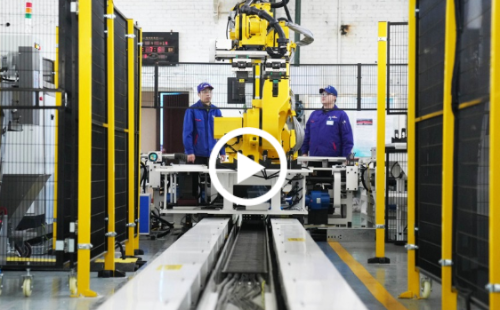Tailored education programs aim to fashion suitable candidates

Baihe Shenghua Construction Tech employees and students from the Zhejiang Business Technology Institute examine an architectural drawing at a site in Zhejiang province. [Photo provided to China Daily]
Zhejiang province has made great efforts to improve the competitiveness of its vocational students at job markets by deepening cooperation with companies to offer tailored education programs.
Chen Youbiao, a 30-year-old project manager at Baihe Shenghua Construction Tech, a company headquartered in Zhejiang's Ningbo city, never thought he would have such a well-paid job until he started taking "order-based" classes jointly launched by the company and the Zhejiang Business Technology Institute in Ningbo in 2018. Every year, the program accepts about 20 students from the school's various majors, including environmental art — which focuses on city planning, interior design, urban planning and artistic design — construction finance and management, and construction engineering technology.
It then educates them in line with plans jointly designed by the company and the institute.
"When they finish their theoretical education in their third year at the institute, the students on the program start yearlong on-site training and education at our offices and factories, where they learn from our highly skilled workers and senior engineers," said Zhang Liangwu, president of Baihe Shenghua, whose business includes building decoration, home design and smart energy projects.
The company provides the students with a monthly stipend of 2,500 to 3,000 yuan ($345 to $410) during the internship, and it also offers them the opportunity of a permanent job after graduation, he added.
Discussing the reasons for launching the program, Zhang said the knowledge students gain at college often fails to match current recruitment requirements and openings, especially since the COVID-19 outbreak, when the market can update and change rapidly.
"After being assigned to their working positions, the students can only apply roughly 40 percent of the knowledge they've learned at school. Their shortage of practical experience may also make them miss out on the best chances for promotion," he added.
Zhou Zhicun, president of the Zhejiang Business Technology Institute, said the school was aware of the problem before the program was launched.
"We've found that the education at universities and colleges is usually unable to keep up with industry developments and can't meet companies' recruitment needs," he said.
"Our cooperation with Baihe Shenghua can help students find more suitable jobs and shorten the time they take to adapt to the work," he said.
"In recent years, we've placed great emphasis on higher-quality education for vocational students by deepening connections with companies. It's also an important way of raising our students' employment rate."
He noted that the employment rate for the school's graduates has been about 98 percent for several years.





